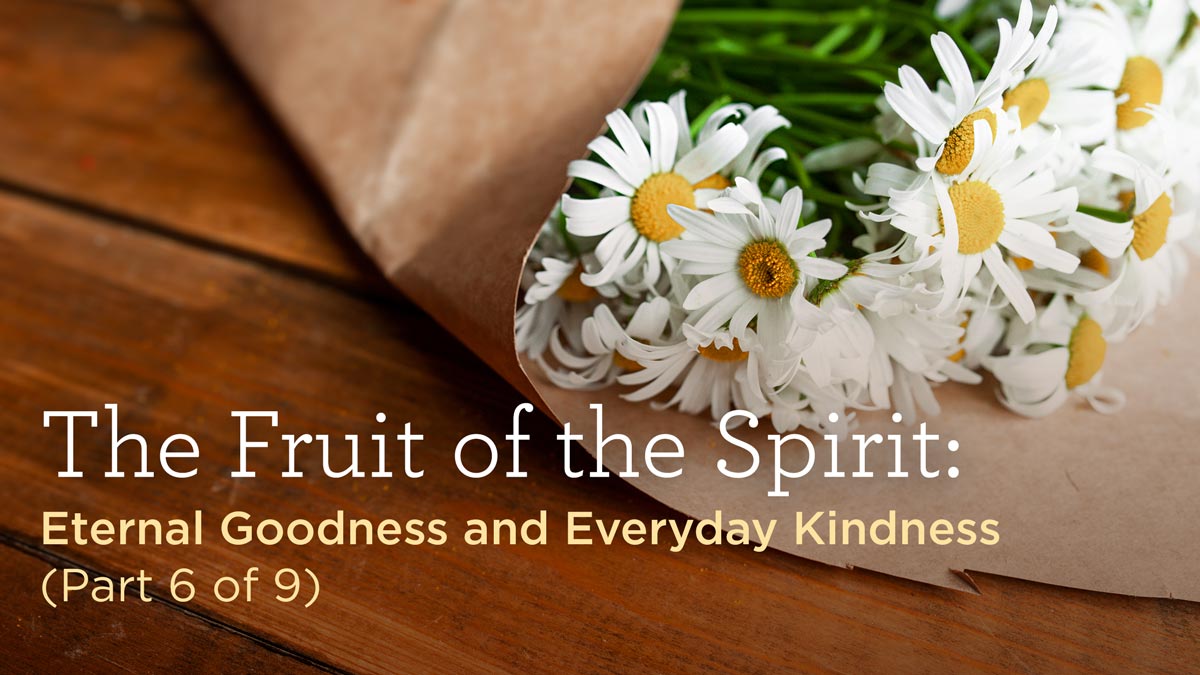
Of all the aspects of the fruit of the Spirit, perhaps kindness and goodness seem the most normal or customary. We often hear talk of “common decency” and “common courtesy,” and we have come to expect that friends, family, and neighbors will show a modicum of kindness in most circumstances—even if they don’t feel like it.
It is all too easy for us to miss, then, just how exceptional and outstanding genuine kindness can be. True kindness isn’t just about having a pleasant attitude or refraining from doing harm to others. Rather, Christian kindness, grounded in God, spills over from a new disposition that seeks others’ ultimate good. This kindness may very well be expressed in the form of everyday pleasantries—a smile, a wave, a nod—but it is always deeply rooted in the self-giving, generous nature of God Himself.
The Goodness of God
Psalm 100 offers us a key summary statement concerning the goodness of God: “The LORD is good; his steadfast love endures forever, and his faithfulness to all generations” (v. 5). God is essentially good, the wellspring of all that is good, true, and beautiful. Existing eternally in love as Father, Son, and Holy Spirit, He is the only and original source of kindness and goodness.
Because God is goodness, He “is good to all, and his mercy is over all that he has made” (Ps. 145:9). Goodness defines His interaction with His creation. And what’s more, His goodness and uprightness compel Him to lead His children “in the way” and “in what is right” (Ps. 25:8, 9). Though we have rebelled time and time again, attempting to hide ourselves from the searchlight of His kind love, God treats us as a kind father to his children, as a tender farmer to his cattle:
Yet it was I who taught Ephraim to walk;
I took them up by their arms,
but they did not know that I healed them.
I led them with cords of kindness,
with the bands of love,
and I became to them as one who eases the yoke on their jaws,
and I bent down to them and fed them. (Hos. 11:3–4)
God is not in the business of coercing people to Himself. He comes in His kindness and in His goodness, fully aware of our wretched predicament. He is, indeed, “kind to the ungrateful and the evil” (Luke 6:35).
Miraculous Kindness
Unlike God, who is benevolent and giving in His very nature, we are all too often preoccupied with ourselves—our plans, our pleasures, our problems. This self-centered focus is all too natural, isn’t it? But when grace begins to refine a heart—when it begins to work its way from the inside out—we begin to look beyond ourselves. We don’t just become more aware of others’ needs; we begin to cultivate a new inner disposition of heart focused on loving, serving, and seeking the well-being of the people around us.
Such self-giving kindness is how the apostle Paul beseeches us to consider others, even as Christ did:
Let each of you look not only to his own interests, but also to the interests of others. Have this mind among yourselves, which is yours in Christ Jesus, who, though he was in the form of God, did not count equality with God a thing to be grasped, but emptied himself, by taking the form of a servant, being born in the likeness of men. And being found in human form, he humbled himself by becoming obedient to the point of death, even death on a cross. (Phil. 2:4–8)
This kind of humility isn’t natural. If anything, most of us are naturally inclined to self-preservation above all. But the deep kindness that we all long to receive and give, epitomized by the humility of Jesus, is a virtue of another order—a supernaturally satisfying, biology- and psychology-defying form of love.
We cannot escape the gravitational pull of otherworldly kindness. We love stories about “paying it forward.” Our world’s best tales always involve kindhearted, sacrificial giving, often of one’s own life, for the good of others. As much as we might suppress them at times, God has woven kindness and goodness into the very fabric of who we are as His image-bearers.
The deep kindness that we all long to receive and give, epitomized by the humility of Jesus, is a virtue of another order—a supernaturally satisfying, biology- and psychology-defying form of love.
Everyday Kindness
Not every act of kindness will take place on a grand scale, however. Sometimes the simplest expressions of kindness mean more than we realize: having the patience and openness to listen to someone and say, “Tell me more”; a smile or pleasant greeting; taking an interest in what excites someone else; even just unloading the dishwasher. Few kind acts will make the headlines or observably change the world, but a small expression reaches further than we imagine. Even if all it does is brighten someone’s day a little, in hard times, that can make a great difference.
Micah contains one famous verse that points us in this direction. In the end, the prophet declares, the Lord is not all that interested in our elaborate service and expensive offerings—at least not if our hearts are far from Him and we find ourselves turning away from the needs of others. So what does God Almighty desire?
He has told you, O man, what is good;
and what does the LORD require of you
but to do justice, and to love kindness,
and to walk humbly with your God? (Micah 6:8)
The Lord may at times require something dramatic of us—and we ought to pray that we will be ready for that, should the need ever arise. Most of the kindness and goodness we show, however, will take the form of everyday fruit: paying workers fair wages, telling the truth, treating all people with respect and dignity, lending a helping hand to neighbors, and so on. After our other accomplishments have long since evaporated, people will remember kindness.
Paul instructs us to “seek to do good to one another and to everyone” (1 Thess. 5:15). Latching onto the heart of this exhortation, someone once put it this way: “Do all the good you can, by all the means that you can, to all the people that you can, for as long as you can.” How might the Lord be pleased to use our lives, our families, and our churches if we committed ourselves afresh to brightening up our communities with such kindness?
After our other accomplishments have long since evaporated, people will remember kindness.
Kindness and Goodness Incarnated
The Holy Spirit bears the fruit of kindness and goodness in our lives because God the Son is the very embodiment of kindness and goodness, and He promised to send His Spirit to be our Helper (John 14:16–17, 26). This glorious truth is put to us this way in Paul’s epistle to Titus:
When the goodness and loving kindness of God our Savior appeared, he saved us, not because of works done by us in righteousness, but according to his own mercy, by the washing of regeneration and renewal of the Holy Spirit, whom he poured out on us richly through Jesus Christ our Savior, so that being justified by his grace we might become heirs according to the hope of eternal life. (Titus 3:4–7)
The advent of Jesus Christ is a profound revelation of God’s fundamental kindness and goodness—the epitome of generous kindness in the flesh. If the Spirit has washed us clean, then we now partake and share in kindness without end, without measure, for eternity. Is it any wonder, then, that kindness and goodness ought to flow out from the very core of the Christian?
It is our turn now. Jesus Christ, as the very embodiment of kindness and goodness, offers to us the grand privilege of portraying glimpses of His generosity to others. Good has appeared to you. Loving kindness has come. With whom can you share this generous grace today?
This article was adapted from the sermon “Kindness and Goodness” by Alistair Begg. Subscribe to get weekly blog updates as this series of new articles is published.
Topics: Articles
